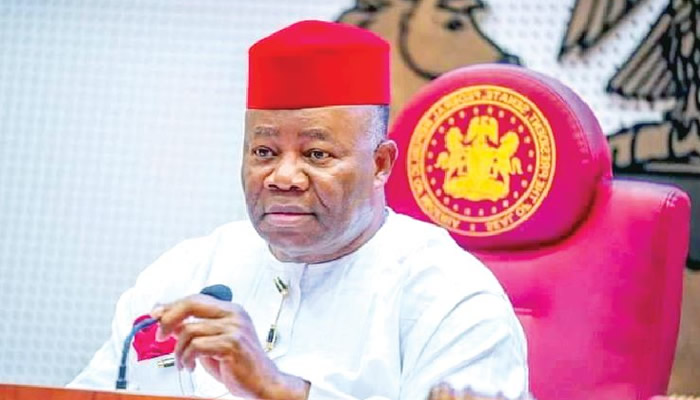Senate President Godswill Akpabio has articulated a vision of collaborative governance, emphasizing the importance of a harmonious relationship between the legislative and executive branches of government. He asserts that the role of lawmakers is not to engage in adversarial politics but to partner with the executive in pursuit of national progress. This cooperative approach, he argues, is essential for effective governance and the advancement of Nigeria’s interests. He underscores that legislators are elected to craft laws that benefit the nation, not to obstruct or undermine the executive’s agenda. This philosophy of collaboration, he believes, is crucial for achieving meaningful development and addressing the challenges facing the country.
Akpabio highlights the unique composition of the current administration, noting that the President, Vice President, and First Lady all have prior experience as senators. This shared background, he suggests, has fostered a deeper understanding and smoother communication between the two branches of government. This alignment, he contends, has facilitated the passage of critical legislation and enabled the government to address key national priorities more effectively. This unprecedented situation, he believes, has created a fertile ground for collaborative policymaking and accelerated national development.
A key legislative priority, according to Akpabio, is promoting local industries and reducing reliance on imports. He revealed that the National Assembly is working on legislation that would mandate government agencies to prioritize the purchase of locally assembled vehicles over foreign ones. This initiative, he explains, is aimed at stemming the outflow of billions of dollars spent annually on vehicle imports and revitalizing domestic industries. He points to the decline of sectors like textiles, cotton, groundnut, and palm oil as evidence of the detrimental effects of over-dependence on imports, contrasting Nigeria’s experience with the success of countries like Malaysia that have leveraged resources like palm oil for economic growth.
Akpabio champions the Tinubu administration’s “Nigeria First” policy, describing it as a crucial strategy for economic revitalization. He outlines plans to collaborate with the Raw Materials Research and Development Council to draft laws that encourage local production across various sectors. The ultimate goal, he emphasizes, is to ensure that goods consumed in Nigeria are, to the greatest extent possible, produced within the country. This approach, he believes, will not only create jobs and stimulate economic growth but also bolster national self-reliance and reduce dependence on foreign goods. He also advocates for greater support for local entrepreneurs, noting that Nigeria’s large population presents a significant market opportunity for small businesses.
Addressing criticisms of the 10th National Assembly being perceived as a rubber stamp for the executive, Akpabio maintains that the Senate has exercised its independence by rejecting some of President Tinubu’s nominees and amending proposals deemed not to be in the public interest. He emphasizes that the National Assembly meticulously scrutinizes every bill from the executive, ensuring it aligns with the needs and realities of the Nigerian people. This process, he argues, demonstrates the Assembly’s commitment to acting as a check on the executive and safeguarding the interests of the citizenry. While acknowledging the importance of collaboration, he insists that the legislature maintains its independent role in the governance process.
Akpabio underscores the 10th National Assembly’s commitment to enacting legislation that improves the lives of Nigerians and supports the President’s reform agenda. He cites the Student Loan Act, Tax Reform Bills, and the Minimum Wage Bill as examples of the Assembly’s achievements in its first two years. He assures the public that further pro-people legislation is forthcoming, focusing on reducing hardship, stimulating economic growth, and empowering young people. He reiterates the Assembly’s commitment to efficient and effective lawmaking, prioritizing bills that directly address the needs of the Nigerian population and contribute to national development. This, he believes, is the core responsibility of the legislature and the key to building a prosperous and equitable Nigeria.


